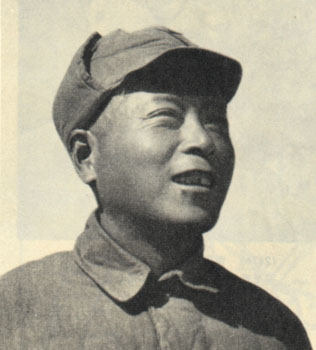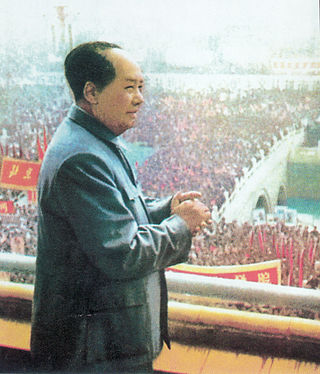Related Research Articles

Mao Zedong, also known as Chairman Mao, was a Chinese politician, revolutionary, and political theorist who founded the People's Republic of China (PRC) and led the country from its establishment in 1949 until his death in 1976. Mao also served as the chairman of the Chinese Communist Party (CCP) from 1943 until his death, and as the party's de facto leader from 1935. His theories, which he advocated as a Chinese adaptation of Marxism–Leninism, are known as Maoism.

The Cultural Revolution, formally known as the Great Proletarian Cultural Revolution, was a sociopolitical movement in the People's Republic of China (PRC). It was launched by Mao Zedong in 1966 and lasted until his death in 1976. Its stated goal was to preserve Chinese socialism by purging remnants of capitalist and traditional elements from Chinese society. Though it failed to achieve its main objectives, the Cultural Revolution marked the effective return of Mao to the center of power in China after his political sidelining, in the aftermath of the Great Leap Forward and the Great Chinese Famine.

Maoism, officially Mao Zedong Thought, is a variety of Marxism–Leninism that Mao Zedong developed while trying to realize a socialist revolution in the agricultural, pre-industrial society of the Republic of China and later the People's Republic of China. A difference between Maoism and traditional Marxism–Leninism is that a united front of progressive forces in class society would lead the revolutionary vanguard in pre-industrial societies rather than communist revolutionaries alone. This theory, in which revolutionary praxis is primary and ideological orthodoxy is secondary, represents urban Marxism–Leninism adapted to pre-industrial China. Later theoreticians expanded on the idea that Mao had adapted Marxism–Leninism to Chinese conditions, arguing that he had in fact updated it fundamentally and that Maoism could be applied universally throughout the world. This ideology is often referred to as Marxism–Leninism–Maoism to distinguish it from the original ideas of Mao.

The Chinese Civil War was fought between the Kuomintang-led government of the Republic of China and the forces of the Chinese Communist Party (CCP), with armed conflict continuing intermittently from 1 August 1927 until Communist victory resulted in their total control over mainland China on 7 December 1949.

The Long March was a military retreat by the Chinese Red Army and Chinese Communist Party (CCP) from advancing Kuomintang forces during the Chinese Civil War, occurring between October 1934 and October 1935. About 100,000 troops retreated from the Jiangxi Soviet and other bases to a new headquarters in Yan'an, Shaanxi, traversing some 6,000 miles. About 8,000 troops ultimately survived the Long March.

The time period in China from the founding of the People's Republic in 1949 until Mao's death in 1976 is commonly known as Maoist China and Red China. The history of the People's Republic of China is often divided distinctly by historians into the Mao era and the post-Mao era. The country's Mao era lasted from the founding of the People's republic on 1 October 1949 to Deng Xiaoping's consolidation of power and policy reversal at the Third Plenum of the 11th Party Congress on 22 December 1978. The Mao era focuses on Mao Zedong's social movements from the early 1950s on, including land reform, the Great Leap Forward and the Cultural Revolution. The Great Chinese Famine, one of the worst famines in human history, occurred during this era.
Quotations from Chairman Mao Tse-tung is a book of statements from speeches and writings by Mao Zedong, the former chairman of the Chinese Communist Party, published from 1964 to 1979 and widely distributed during the Cultural Revolution.
Ping-pong diplomacy refers to the exchange of table tennis (ping-pong) players between the United States and the People's Republic of China in the early 1970s. Considered a turning point in relations between the United States and the People's Republic of China, it began during the 1971 World Table Tennis Championships in Nagoya, Japan, as a result of an encounter between players Glenn Cowan and Zhuang Zedong. These interactions sparked diplomatic breakthrough, by signaling that both sides were willing to interact and engage in dialogue. The exchange and its promotion helped people in each country to recognize the humanity in the people of the other country, and it paved the way for President Richard Nixon's visit to Beijing in 1972 and the Shanghai Communiqué. The Shanghai Communiqué was a pivotal diplomatic document issued on February 28, 1972, during President Richard Nixon's visit to China. It marked a significant shift in U.S.-China relations, as both countries acknowledged their differences while committing to improving their relationship, ultimately setting the stage for détente between the two nations.
"The East Is Red" is a Chinese Communist Party revolutionary song that was the de facto national anthem of the People's Republic of China during the Cultural Revolution in the 1960s. The lyrics of the song were attributed to Li Youyuan (李有源), a farmer from Shaanbei, and the melody was derived from a local peasant love song from the Loess Plateau entitled "Bai Ma Diao" 《白马调》, also known as "Zhima You" 《芝麻油》, which was widely circulated in the area around Yan'an in the 1930s. The farmer allegedly got his inspiration upon seeing the rising sun in the morning of a sunny day.

Edgar Parks Snow was an American journalist known for his books and articles on communism in China and the Chinese Communist Revolution. He was the first Western journalist to give an account of the history of the Chinese Communist Party following the Long March, and he was also the first Western journalist to interview many of its leaders, including Mao Zedong. He is best known for his book, Red Star Over China (1937), an account of the Chinese Communist movement from its foundation until the late 1930s.

Chen Boda, was a Chinese Communist journalist, professor and political theorist who rose to power as the chief interpreter of Maoism in the first 20 years of the People's Republic of China. Chen became a close associate of Mao Zedong in Yan'an, during the late 1930s, drafting speeches and theoretical essays and directing propaganda.

The Red Guards were a mass, student-led, paramilitary social movement mobilized by Chairman Mao Zedong in 1966 until their abolishment in 1968, during the first phase of the Cultural Revolution, which he had instituted.

Propaganda in China is used by the ruling Chinese Communist Party (CCP), and historically by the Kuomintang (KMT), to sway domestic and international opinion in favor of its policies. Domestically, this includes censorship of proscribed views and an active promotion of views that favor the government. Propaganda is considered central to the operation of the CCP and the Chinese government, with propaganda operations in the country being directed by the CCP's Central Propaganda Department.
The mass line is a political, organizational, and leadership methodology developed by Mao Zedong and the Chinese Communist Party (CCP) during the Chinese Communist Revolution. Who used the term first is disputed, with some crediting Li Lisan and others Zhou Enlai. In mass line methodology, leadership formulates policy based on theory, implements it based on the people's real world conditions, revises the theory and policy based on actual practice, and uses that revised theory as the guide to future practice. This process is summarized as leadership "from the masses, to the masses", repeated indefinitely.
In People's Republic of China (1949–), revolutionary operas or model operas were a series of shows planned and engineered during the Cultural Revolution (1966–1976) by Jiang Qing, the wife of Chairman Mao Zedong. They were considered revolutionary and modern in terms of thematic and musical features when compared with traditional Chinese operas. Many of them were adapted to film.

The Founding of a Party, alternatively titled in English Beginning of the Great Revival for its international release, is a Chinese propaganda film released in 2011 to mark the 90th anniversary of the Chinese Communist Party. The film is directed by Huang Jianxin and Han Sanping, both of whom also worked on the related film, The Founding of a Republic, which features a star-studded cast of Chinese actors, including Andy Lau and Chow Yun-fat. The film was created by the state-owned China Film Group and depicts the formation of the Chinese Communist Party, beginning with the fall of the Qing dynasty in 1911 and ending with the Party's founding congress in 1921.

Founded in 1911, the Tsinghua University is located on the site of Tsinghua Garden in Beijing, the former residence of Prince Yinzhi, the third son of the Kangxi Emperor of the Qing dynasty.

Li Jingquan was a Chinese politician and the first Chinese Communist Party Committee Secretary of Sichuan following the establishment of the People's Republic of China in 1949. He supported many of Mao Zedong's policies including the Great Leap Forward.

Xu Xiaobing 徐肖冰 was a Chinese cinematographer, filmmaker, and photojournalist. The Chinese Communist Party commissioned Xu and his wife, Hou Bo, to make an official photographic record to share with the Chinese and world public of Party leaders, scenes of battle, and vignettes of everyday life during the Second Sino-Japanese War (1937–1945) and especially of Mao Zedong from the 1930s down to the 1960s. The couple shot many of the best-known photos of Mao and other leaders.

Mao Zedong's cult of personality was a prominent part of Chairman Mao Zedong's rule over the People's Republic of China from the state's founding in 1949 until his death in 1976. Mass media, propaganda and a series of other techniques were used by the state to elevate Mao Zedong's status to that of an infallible heroic leader, who could stand up against the West, and guide China to become a beacon of communism.
References
- Hendershot, Cynthia (2003). Anti-Communism and Popular Culture in Mid-Century America. McFarland. ISBN 978-0-7864-1440-6 . Retrieved April 19, 2021.
- Wasserstrom, Jeffrey N. (2010). China in the 21st Century: What Everyone Needs to Know. Oxford University Press. ISBN 978-0-19-539447-4 . Retrieved April 19, 2021.